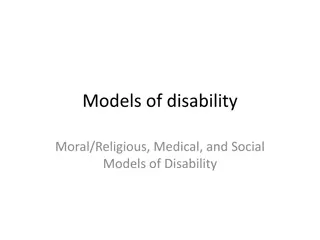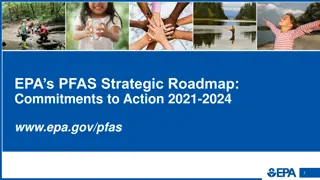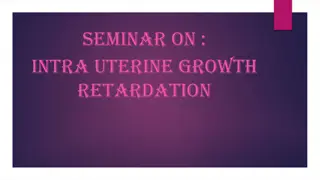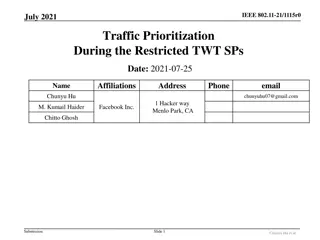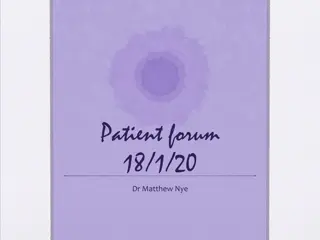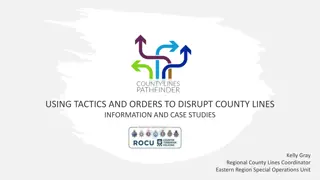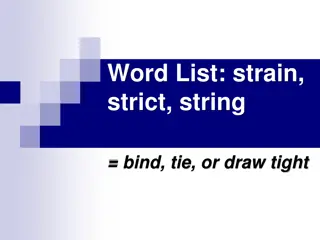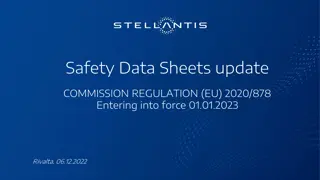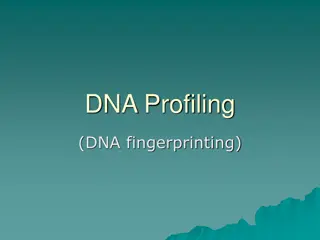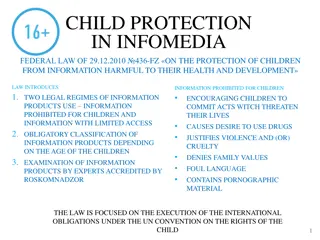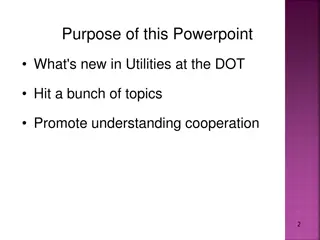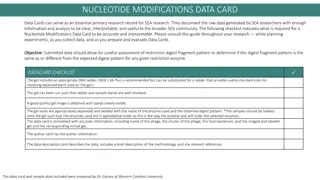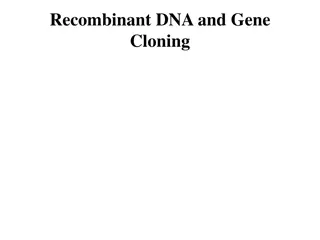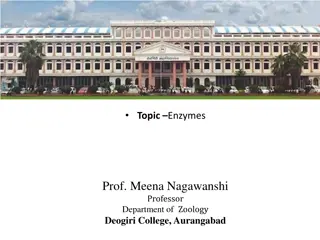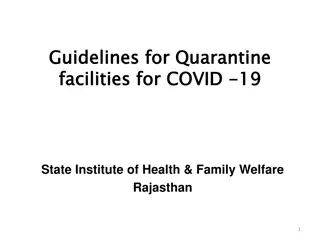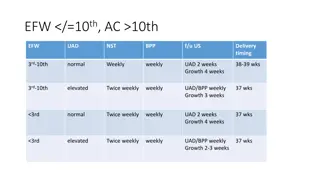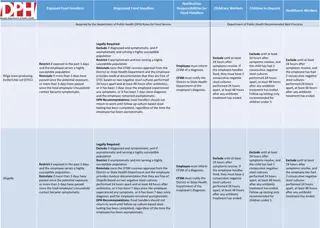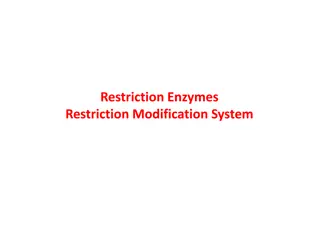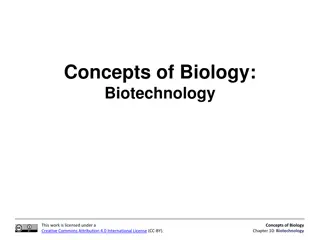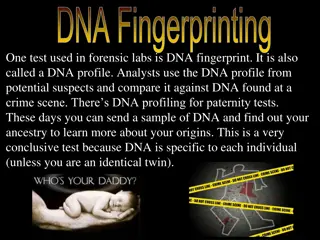Understanding Models of Disability: Moral, Medical, and Social Perspectives
The concept of disability is explored through moral/religious, medical, and social models. Impairment refers to a loss or abnormality in structure or function, while disability is a restriction in performing activities. The discussion also delves into the significance of person-first language and th
1 views • 35 slides
EPA's PFAS Strategic Roadmap: Commitments to Action 2021-2024
EPA's PFAS Strategic Roadmap, initiated by Administrator Michael Regan, outlines key actions from 2021-2024 to safeguard public health and the environment from Per- and Polyfluoroalkyl Substances (PFAS). It includes a comprehensive approach, timelines, and support for state efforts. PFAS are a group
5 views • 13 slides
Genetic Transformation: Introduction and Pre-Lab Inquiry
Explore the process of genetic transformation in the laboratory setting, focusing on inserting genes of interest into bacterial cells through recombinant DNA technology. Understand the role of restriction enzymes, plasmids, and genetic markers in this procedure. Engage in a pre-lab inquiry to identi
0 views • 14 slides
Pulsed-Field Gel Electrophoresis: Separating Large DNA Molecules
Pulsed-Field Gel Electrophoresis (PFGE) is a technique developed to effectively separate large DNA molecules through the application of an electric field that periodically changes direction. This method, introduced by David C. Schwartz and Charles C. Cantor in 1984, revolutionized the resolution of
1 views • 11 slides
Understanding Intrauterine Growth Retardation: Causes, Diagnosis, and Management
Intrauterine growth restriction (IUGR) refers to poor fetal growth in the womb, often due to maternal factors or inadequate oxygen supply. This condition can lead to increased risks for the baby. Topics covered include definition, incidence, normal fetal growth, stages, causes, diagnosis, and manage
1 views • 50 slides
IEEE 802.11-21/1115r0 Traffic Prioritization Summary
The presentation discusses traffic prioritization rules during restricted TWT SPs in IEEE 802.11-21/1115r0. It revisits the topic to address pending items related to traffic restriction or prioritization, including specific rules for APs, scheduled STAs, supporting non-AP STAs, and non-rTWT STAs. Co
1 views • 14 slides
Strategies for Maintaining Liver Health in the New Year
The article discusses five effective strategies to improve liver health, focusing on caloric restriction, intermittent fasting, exercise, and caution in weight loss efforts. It emphasizes the importance of adopting healthy lifestyle interventions to prevent liver diseases such as NAFLD and provides
4 views • 14 slides
Using Tactics and Orders to Disrupt County Lines: Case Studies and Strategies
Exploring the approach of using tactics and orders to disrupt county lines, this content outlines the Drug Dealing Telecommunications Restriction Order (DDTRO) process and its impact on drug supply chains. Case studies like the successful DDTRO conducted by the North West Regional Organised Crime Un
0 views • 21 slides
Exploring the Roots and Meanings of "Strain", "Strict", and "String
Dive into the origins and definitions of words like strain, strict, and string that convey concepts of binding, tightness, and demanding attention to rules. Uncover how these roots are reflected in words like restriction, stringent, and astringent, each with its own unique significance across variou
2 views • 21 slides
Safety Data Sheets Regulation (EU) 2020/878 Update Summary
The Commission Regulation (EU) 2020/878 mandates the update of Safety Data Sheets (SDS) by suppliers before 1st January 2023. Failure to comply will result in non-acceptance of non-updated SDSs and restriction on air shipments. The updates include changes to Introduction of Annex II and Section 1 of
0 views • 7 slides
Understanding Nocturnal Enuresis in Children: Causes, Treatment, and Prevention
Nocturnal enuresis, also known as bedwetting, is a common issue in children, with causes ranging from genetic factors to poor sleep quality. This condition can have a significant impact on a child's self-esteem and family dynamics. Effective management strategies include fluid restriction, rewarding
0 views • 20 slides
Understanding DNA Profiling: Techniques and Applications
DNA profiling, invented by Alec Jeffreys in 1985, is a technique used to distinguish between individuals of the same species based on their DNA. The process involves breaking down cells to release DNA, cutting the DNA into fragments using restriction enzymes, separating and analyzing fragments based
12 views • 23 slides
Analysis of Sir Thomas Wyatt's Poem "Whoso List to Hunt
Sir Thomas Wyatt's poem "Whoso List to Hunt" serves as a metaphorical exploration of pursuit and unattainable love, possibly inspired by his interactions with Anne Boleyn. The poem intricately depicts the speaker's futile pursuit of a deer, symbolizing a woman. Through an octave and sestet structure
0 views • 11 slides
Understanding Anorexia Nervosa: Symptoms and Psychopathology
Anorexia nervosa is a serious eating disorder characterized by food restriction, bingeing, purging, and distorted body image. Common symptoms include excessive exercise, body checking, and rigid food rules. Psychopathology aspects include intrusive dread of fatness, self-imposed low weight threshold
0 views • 42 slides
Child Protection Laws in Russia and Enforcement Mechanisms
The Federal Laws of Russia focus on protecting children from harmful information by introducing legal regimes, mandatory classification of information products, and expert examinations. The laws prohibit content encouraging dangerous behaviors or undermining family values. Weekly monitoring detects
0 views • 10 slides
Enhancing Utility Coordination for DOT Projects in Iowa
This PowerPoint presentation delves into the key aspects of utility coordination for Department of Transportation (DOT) projects in Iowa. Covering topics such as Buy America regulations, lane restriction notifications, utility accommodation policies, and coordination methods, the presentation aims t
0 views • 17 slides
Comprehensive Guide for Nucleotide Modifications Data Card in SEA Research
Nucleotide Modifications Data Cards are vital primary research records that document raw data generated by SEA researchers. The checklist ensures accuracy and interpretability when analyzing restriction digest fragment patterns. Follow the instructions for obtaining genomic sequences and comparing v
0 views • 8 slides
Understanding Recombinant DNA and Gene Cloning
Recombinant DNA is artificially created by combining DNA from multiple sources into a single molecule. This process involves treating DNA with restriction endonucleases, such as BamHI, which cut at specific sites, resulting in sticky ends that can base pair with complementary DNA molecules. DNA liga
0 views • 33 slides
Understanding Enzymes and Restriction Enzymes in Molecular Biology
Enzymes are essential proteins that catalyze biochemical reactions. Bacteria have evolved enzymes like restriction endonucleases to protect against foreign DNA, such as viral DNA. The discovery of restriction enzymes in E. coli led to the Nobel Prize in Medicine in 1978. These enzymes cut DNA at spe
0 views • 24 slides
Insights on Hidden Edge Guards and Guard Varieties
Explore various studies and findings on hidden edge guards with a focus on Victor Klee's Art Gallery Problem, the restriction of guards not seeing each other by Thomas Shermer, and different guard varieties. Discover the challenges and solutions associated with guarding polygons in different configu
0 views • 16 slides
Evolutionary Insights from Mitochondrial DNA Analysis in Primates
Studies by Ferris et al. and Cann et al. utilized mitochondrial DNA analysis to understand the evolutionary relationships among apes and humans. The application of parsimony to restriction sites revealed the closest genetic ties between species and proposed an African origin for human colonization.
0 views • 13 slides
Guidelines for COVID-19 Quarantine Facilities by State Institute of Health & Family Welfare
Quarantine is the separation and restriction of movement to prevent disease transmission. It can be applied at individual or group levels, with a recommended duration of up to 14 days for COVID-19. Quarantine facilities should be located away from populated areas, well secured, and easily accessible
0 views • 42 slides
Maternal-Fetal Medicine: Diagnosis & Management of Fetal Growth Restriction
This information provides guidelines for monitoring fetal growth based on estimated fetal weight, abdominal circumference, uterine artery Doppler, non-stress test, and biophysical profile. It outlines strategies for surveillance, including frequency and types of tests based on gestational age and gr
0 views • 5 slides
Food Handlers Notification Responsibilities and Best Practices
Food handlers, childcare workers, and healthcare workers have specific responsibilities when diagnosed or exposed to certain pathogens according to Department of Public Health rules. They must follow exclusion, restriction, and reinstatement protocols based on symptomatology and antibody treatment.
0 views • 5 slides
EU Bans Sale of Synthetic Turf Infill Materials by 2031 due to Microplastic Concerns
The European Commission has adopted a REACH restriction to ban the sale of rubber and plastic infill materials used in synthetic turf surfaces, aiming to reduce the release of microplastics into the environment. This ban is set to take effect in September 2031, granting a transition period of 8 year
0 views • 19 slides
Understanding Restriction Enzymes: The Key Players in DNA Manipulation
Restriction enzymes play a crucial role in cutting DNA molecules at specific points, allowing for precise genetic manipulation. This system involves host-controlled restriction and modification mechanisms to defend against foreign DNA, ensuring DNA integrity. Endonucleases recognize specific sequenc
0 views • 17 slides
Exploring Biotechnology: Concepts and Techniques
Biotechnology encompasses a range of techniques and processes aimed at manipulating biological systems for various applications. This includes methods like PCR for DNA amplification, DNA extraction, gel electrophoresis for DNA fragment analysis, and restriction enzyme processes for DNA manipulation.
1 views • 22 slides
Understanding DNA Fingerprinting and Its Applications
DNA fingerprinting, also known as DNA profiling, is a crucial technique used in forensic labs for identifying suspects or determining paternity. By cutting DNA with restriction enzymes and using gel electrophoresis, DNA fragments are separated according to size to create unique profiles. This highly
0 views • 20 slides
Understanding DNA Linkers, Adapters, and Selection of Recombinants
DNA linkers and adapters play crucial roles in genetic engineering by facilitating ligation of DNA molecules and selecting appropriate restriction enzymes. Furthermore, DNA hybridization allows for the assessment of evolutionary relatedness based on base pair sequences. This process involves the for
0 views • 5 slides
